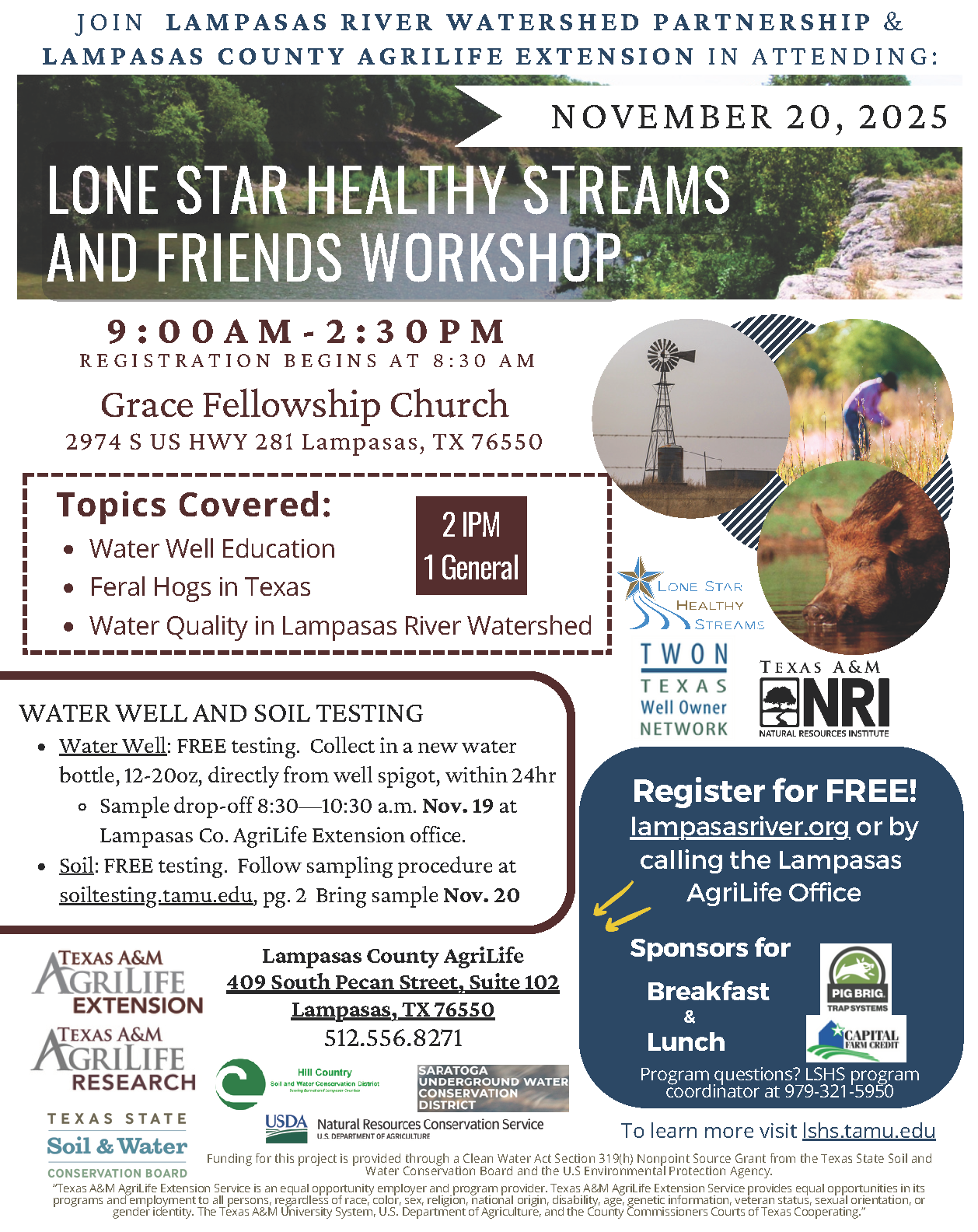Lone Star Healthy Streams and Friends Workshop 2025

Workshop Details
November 20, 2025; 9:00 am - 2:30 pm
Grace Fellowship Church (map)
2974 US-281 Lampasas, TX 76550
Doors open at 8:3 AM for Sign In
3 CEUs available for TDA Private Pesticide Applicators License Holders
Pre-registration is requested by November 17, 2025
Pre-register either online at www.lampasasriver.org or by calling the Lampasas County AgriLife Extension office at 512-556- 8271
Workshop Description
This workshop will feature the Lampasas River Watershed and local efforts to improve water quality. Topics covered will include basic watershed function, water quality and specific best-management practices that can be voluntarily implemented to help minimize bacterial contamination originating from grazing livestock, wild pigs and pasture weed management and private water wells. Participants will also learn about local resources for technical and financial assistance. The aim is to increase awareness, provide education materials to Texas producers and landowners, and encourage implementation.
Breakfast and a barbeque lunch are sponsored by PigBrig and Capital Farm Credit, respectively.
Participants are also eligible for FREE private water well sample analysis and a soil test analysis, offered through Texas A&M and AgriLife Extension! Instruction for each are below.
One General and two Integrated Pest Management (IPM) Texas Department of Agriculture continuing education credits for pesticide applicators are available, sponsored by Hill Country Soil & Water Conservation District.
For more information on the Lone Star Healthy Streams program, contact Leanne Wiley at 979-240-8407 or leanne.wiley@ag.tamu.edu. For more information about the upcoming class, please contact Lisa Prcin at 254-774-6008 or lprcin@brc.tamus.edu or Heath Lusty, Lampasas County AgriLife Extension agent at 512-556- 8271.
Water Well Sampling Instructions:
Please use a new bottle of water (12-20 ounces), pour out the contents and fill it with a water sample from your private water well. Take the sample from the spigot/hose bib nearest to the well head. Remove the water hose if there is one and take directly from the spigot/hose bib. If an inside faucet is used, you will need to remove the aerator on faucet before making the collection. Rinse and dry the exterior of the faucet to prevent exterior contamination of your water sample. If possible, wipe off with a Clorox-type towelette or paper towel wetted with a light bleach solution to kill any bacteria present on the faucet. Allow the solution to dry before sampling. Turn on the water full force and let it run at full force for two minutes or until you hear the pump start running. Reduce the water flow to a small stream.
Refrigerate the sample and transport it to the workshop (in an ice chest) as soon after collection as possible. It is best to collect the day of the workshop if that is possible otherwise make sure the sample is kept cool and out of direct sunlight. Sample should be collected within 24 hours before the workshop to ensure accurate results.
We encourage you to bring samples from all wells on your property; many participants that have water treatment equipment take samples before and after treatment to make sure the equipment is functioning properly. Also we need for you to label the sample with your name (if you bring more than one sample you also need to label the sample in some way to make sure you know which well the sample comes from). We will be screening for Nitrates, TDS (salinity) and bacteria (absence or presence of coliform and E. coli) with your sample.
This round of water well screening will be FREE for attendees, and you may bring as many samples as you would like.
Soil Sampling Instructions:
Soil samples should be from pasture or rangeland areas. Limited 2 per attendee. Samples can be dropped off on the 19th at the Lampasas AgriLife Extension office or brought to the education meeting on the 20th. No official bag is needed for drop-off, lab bags will be provided at the meeting.
Soil sampling instructions are found on the soil submittal form at the Texas A&M AgriLife Extension Soil, Water and Forage Testing Laboratory website or ask your AgriLife County agent for guidance.